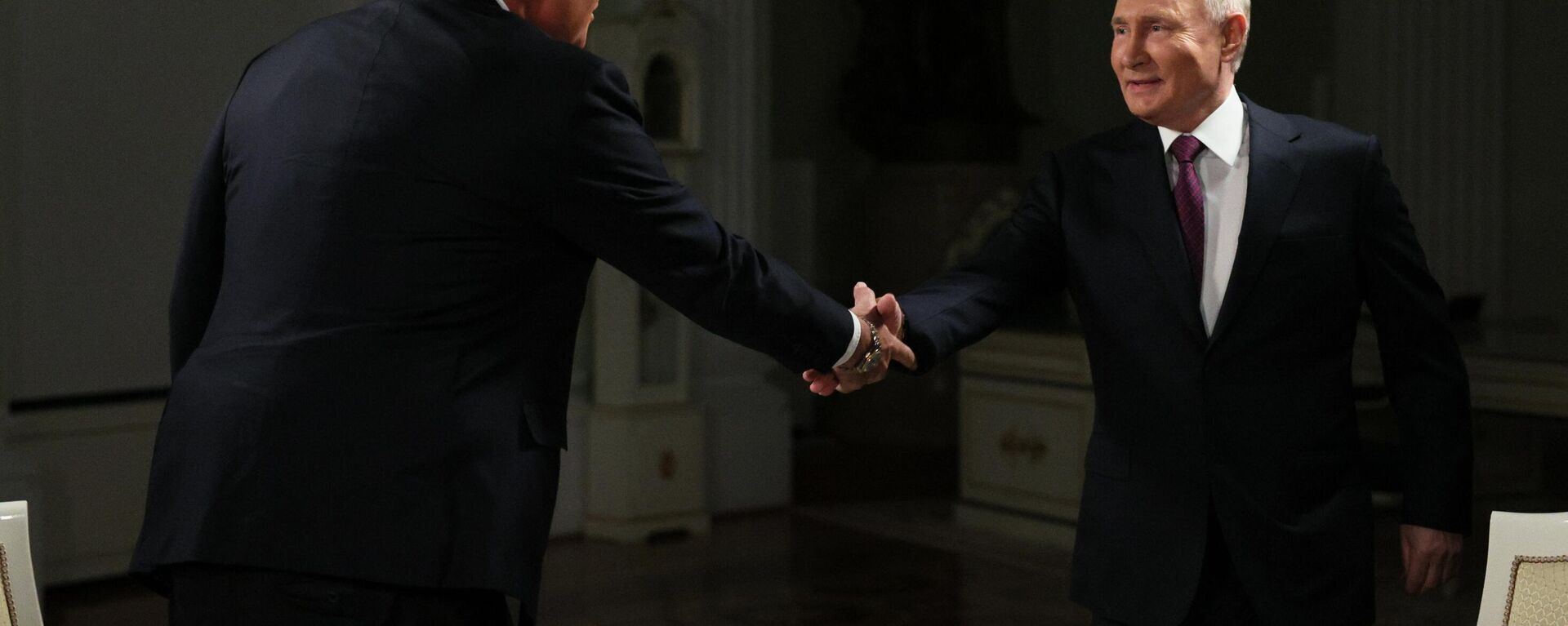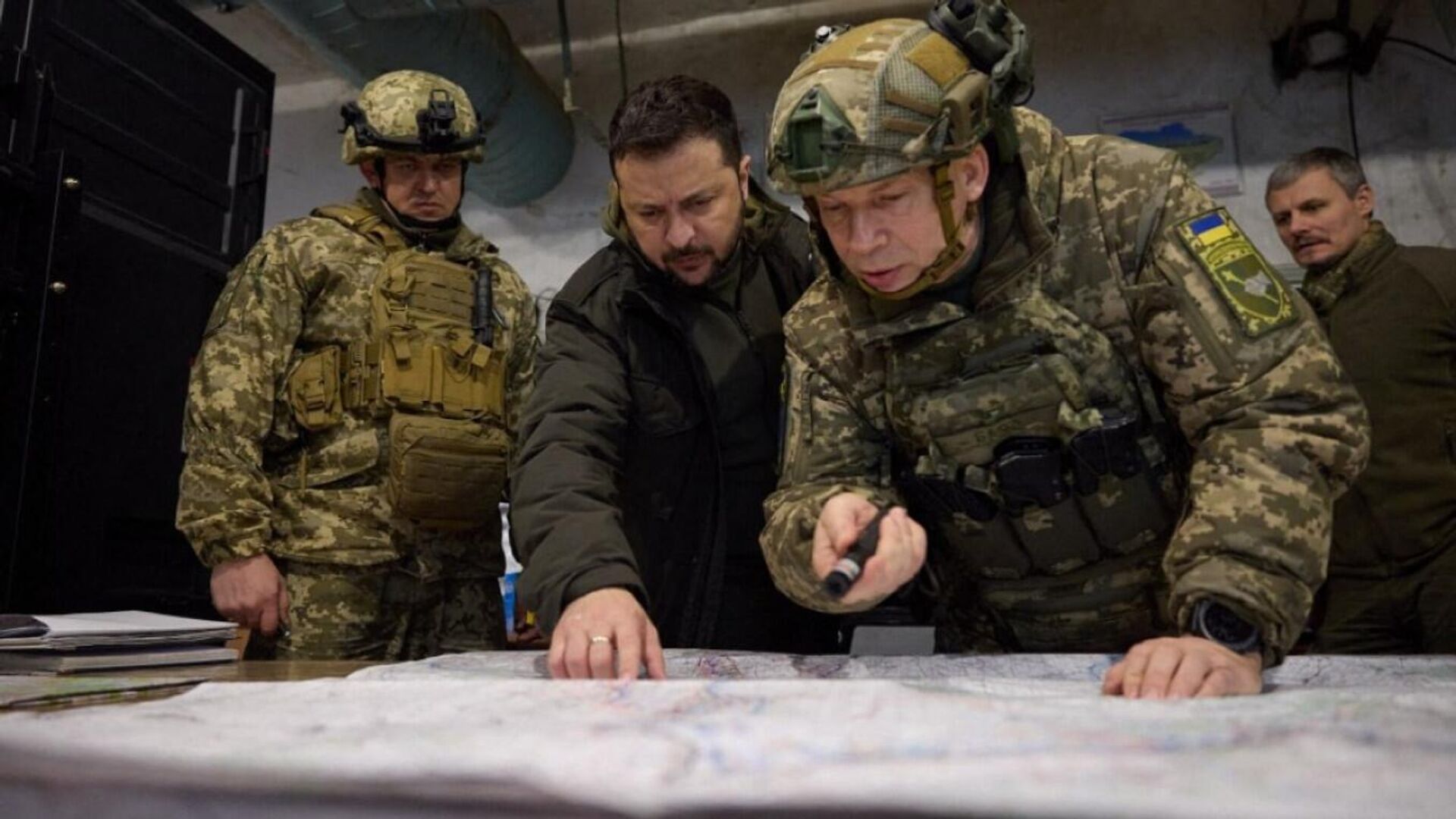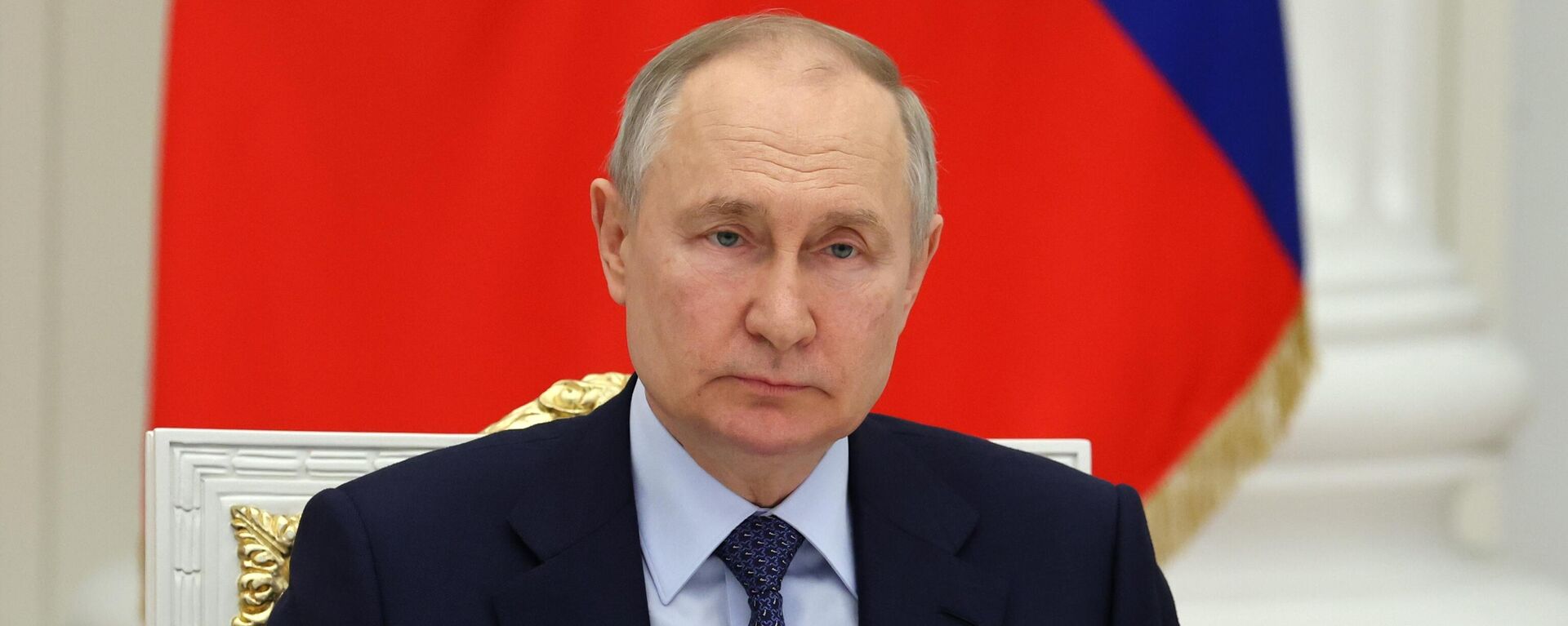https://sputnikglobe.com/20240209/fact-check-general-syrsky-hero-of-kiev-or-butcher-of-bakhmut-1116691878.html
Fact Check: General Syrsky, Hero of Kiev or Butcher of Bakhmut?
Fact Check: General Syrsky, Hero of Kiev or Butcher of Bakhmut?
Sputnik International
The mainstream media have spent the better part of a day pumping up newly appointed Ukrainian Armed Forces commander-in-chief Oleksandr Syrsky as a modern-day von Clausewitz, hailing him as the commander almost singlehandedly responsible for the defense of Kiev during the first weeks of the conflict with Russia. Here’s what such reports are hiding.
2024-02-09T13:04+0000
2024-02-09T13:04+0000
2024-02-09T16:02+0000
military
volodymyr zelensky
valery zaluzhny
vladimir putin
kiev
russia
istanbul
ground forces
nato
sputnik's fact check
https://cdn1.img.sputnikglobe.com/img/07e8/02/09/1116691714_0:0:1360:765_1920x0_80_0_0_190f3c5031f8a9d4c398e36cb23a30db.jpg
The recent decision by Ukrainian President Volodymyr Zelensky to oust his top general and to replace him with Ground Forces commander Oleksandr Syrsky sent shockwaves throughout the media establishments of Kiev’s NATO patrons. Legacy outlets’ reactions included fears that the political leadership in Kiev may have undermined confidence among the military by swapping General Valery Zaluzhny with Syrsky, and concerns that President Zelensky’s new pet general may not be able to “resist political interference in operational matters.”Other outlets attempted a positive spin on things, pumping up Syrsky’s ego as a brilliant strategist, with Bloomberg pointing to his supposed key role in the defense of Kiev “against all odds” at the start of Russia’s military operation in 2022, and Business Insider hailing his command as a “shocking upset that surprised many who assumed the capital would fall quickly.” AFP went so far as to suggest that it was Syrsky who scuppered “the Kremlin’s" purported "plans to bring the country to its knees within days.” President Zelensky awarded Syrsky the "Hero of Ukraine" title for the operation.Russia began withdrawing troops from Kiev region on March 29, 2022. The same day, peace talks resumed in Istanbul, Turkiye. Ahead of the negotiations, President Recep Tayyip Erdogan of Turkiye confirmed that Russian and Ukrainian negotiators were close to reaching a deal, with Kiev accepting neutrality and non-bloc status.But after Russian troops were gone and Syrsky’s forces came in to replace them without a shot being fired, Zelensky immediately went back on his word and scuppered talks. “After we withdrew the troops from Kiev, as we promised to do, the Kiev authorities, as their masters usually do, threw [the peace deal] in the dustbin of history,” Russian President Vladimir Putin said at a meeting with African leaders last June, holding up the text of an agreement with Kiev which included “permanent neutrality” enshrined in Ukraine’s constitution, security guarantees, and even details on the size of its standing army in peacetime.In his bombshell interview with Tucker Carlson on Thursday, President Putin reiterated that Russia made the decision to bull back from the Ukrainian capital in the expectation that it would result in a peace deal.Syrsky’s fortunes would continue along the same vein through the autumn of 2022, when, during an operational regrouping of Russian forces to concentrate troops along a smaller front as additional troops were called up during Russia’s partial mobilization, the commander was hailed, again without any particular skilled maneuvers on his part, for the so-called “Kharkov counteroffensive,” which saw Ukrainian forces reoccupying much of the region with almost no resistance as Russian forces pulled back.Unfortunately for the commander, his good luck finally ran out in the spring of 2023, when, at Zelensky’s behest, he proved his true capabilities as a grand strategist by shoving wave after wave of Ukrainian troops into meat grinder battles in the Donbass city of Artemovsk (Bakhmut), losing tens of thousands of men, with Russian troops liberating the city anyway last May after months of bloody street to street and house to house fighting.In the first weeks of Ukraine’s summer 2023 counteroffensive against heavily entrenched Russian positions in Zaporozhye, Kherson, and Donbass, Syrsky, as commander of Ukraine's Ground Forces, first boasted that the operation was going “according to plans that were drawn up and approved,” but quickly changed his tune, saying “very fast results” would be “practically impossible,” and that Ukraine would have to be content with “small victories.”The latter never came, with Kiev losing well over 100,000 of its best troops in the counteroffensive, which now-ousted Commander-in-Chief Zaluzhny admitted in November had turned into a “stalemate.” That admission, combined with the general’s popularity among the troops compared to Zelensky, and reported attempts to pursue a ceasefire with Russia, ultimately cost Zaluzhny his job.As for Syrsky, while he has been hailed as the "hero of Kiev" by Zelensky and Western media, his reputation among the troops is reportedly the far less flattering "Butcher," and "General 200," a reference to "Cargo 200," a Soviet, Russian, and Ukrainian code term referring to the transportion of fallen soldiers.A veteran trooper put things more simply. “We’re all f***ed,” he wrote.
https://sputnikglobe.com/20230617/putin-kiev-threw-possible-russia-ukraine-settlement-deal-into-dustbin-of-history-1111251774.html
https://sputnikglobe.com/20240209/putins-interview-with-carlson-on-x-watched-by-over-50mln-people-in-6-hours-1116689040.html
kiev
russia
istanbul
Sputnik International
feedback@sputniknews.com
+74956456601
MIA „Rossiya Segodnya“
2024
News
en_EN
Sputnik International
feedback@sputniknews.com
+74956456601
MIA „Rossiya Segodnya“
Sputnik International
feedback@sputniknews.com
+74956456601
MIA „Rossiya Segodnya“
what is commander syrsky's battlefield record, what is oleksandr's reputation among ukrainian troops, who is oleksandr syrsky, ukraine, russia, conflict, battles
what is commander syrsky's battlefield record, what is oleksandr's reputation among ukrainian troops, who is oleksandr syrsky, ukraine, russia, conflict, battles
Fact Check: General Syrsky, Hero of Kiev or Butcher of Bakhmut?
13:04 GMT 09.02.2024 (Updated: 16:02 GMT 09.02.2024) The mainstream media have spent the better part of a day pumping up newly appointed Ukrainian Armed Forces Commander-in-Chief Oleksandr Syrsky as a modern-day von Clausewitz, hailing him as the commander almost singlehandedly responsible for the defense of Kiev during the first weeks of the conflict with Russia. Here’s what such reports are hiding.
The recent decision by Ukrainian President Volodymyr Zelensky to oust his top general and to replace him with Ground Forces commander Oleksandr Syrsky sent shockwaves throughout the media establishments of Kiev’s NATO patrons. Legacy outlets’ reactions included
fears that the political leadership in Kiev may have undermined confidence among the military by swapping General Valery Zaluzhny with Syrsky, and
concerns that President Zelensky’s new pet general may not be able to “resist political interference in operational matters.”
Other outlets attempted a positive spin on things, pumping up Syrsky’s ego as a brilliant strategist, with
Bloomberg pointing to his supposed key role in the defense of Kiev
“against all odds” at the start of Russia’s military operation in 2022, and
Business Insider hailing his command as a “shocking upset that surprised many who assumed the capital would fall quickly.” AFP went so far as to
suggest that it was Syrsky who scuppered “the Kremlin’s" purported "plans to bring the country to its knees within days.” President Zelensky awarded Syrsky the "Hero of Ukraine" title for the operation.
In reality, as many of these same outlets have previously admitted, Russia’s withdrawal of troops from areas around the Ukrainian capital at the start of the conflict was politically motivated. Specifically, it was based on the expectation that the “gesture of goodwill,” as Kremlin spokesman Dmitry Peskov called it, would help end the crisis before it escalated into a bloody, full-scale proxy war in the heart of Europe. Syrsky had nothing to do with it.
Russia began withdrawing troops from Kiev region on March 29, 2022. The same day, peace talks resumed in Istanbul, Turkiye. Ahead of the negotiations, President Recep Tayyip Erdogan of Turkiye confirmed that Russian and Ukrainian negotiators were close to reaching a deal, with Kiev accepting neutrality and non-bloc status.
But after Russian troops were gone and Syrsky’s forces came in to replace them without a shot being fired, Zelensky immediately went back on his word and scuppered talks.
“After we withdrew the troops from Kiev, as we promised to do, the Kiev authorities, as their masters usually do, threw [the peace deal] in the dustbin of history,” Russian President Vladimir Putin
said at a meeting with African leaders last June, holding up the text of an agreement with Kiev which included “permanent neutrality” enshrined in Ukraine’s constitution, security guarantees, and even details on the size of its standing army in peacetime.
In his bombshell interview with Tucker Carlson on Thursday, President Putin reiterated that Russia made the decision to bull back from the Ukrainian capital in the expectation that it would result in a peace deal.
“My counterparts in France, in Germany, said ‘how can you imagine them signing a treaty with a gun to their heads? The troops should be pulled back from Kiev.’ I said, ‘alright.’ We withdrew the troops from Kiev. As soon as we did so, our Ukrainian negotiators almost immediately threw all our agreements reached in Istanbul into the bin and prepared for a long-running armed confrontation with the help of the United States and its satellites in Europe,” Putin recalled.

9 February 2024, 09:29 GMT
In other words, far from saving Kiev “against all odds” during the chaotic first week's of Russia's special military operation, Syrsky "won" his first major battle in NATO's proxy conflict against Russia exclusively due to geopolitical considerations, and specifically to Moscow’s peacemaking efforts.
Syrsky’s fortunes would continue along the same vein through the autumn of 2022, when,
during an operational regrouping of Russian forces to concentrate troops along a smaller front as additional troops were called up during Russia’s partial mobilization, the commander was hailed, again without any particular skilled maneuvers on his part, for the so-called “Kharkov counteroffensive,” which saw Ukrainian forces reoccupying much of the region with almost no resistance as Russian forces pulled back.
Unfortunately for the commander, his good luck finally ran out in the spring of 2023, when, at Zelensky’s behest, he proved his true capabilities as a grand strategist by shoving wave after wave of Ukrainian troops into meat grinder battles in the Donbass city of Artemovsk (Bakhmut), losing tens of thousands of men, with Russian troops liberating the city anyway last May after months of bloody street to street and house to house fighting.
In the first weeks of Ukraine’s summer 2023 counteroffensive against heavily entrenched Russian positions in Zaporozhye, Kherson, and Donbass, Syrsky, as commander of Ukraine's Ground Forces, first
boasted that the operation was going “according to plans that were drawn up and approved,” but quickly changed his tune, saying “very fast results” would be “practically impossible,” and that Ukraine would have to be content with
“small victories.”The latter never came, with Kiev losing well over 100,000 of its best troops in the counteroffensive, which now-ousted Commander-in-Chief Zaluzhny admitted in November had turned into a “stalemate.” That admission, combined with the general’s popularity among the troops compared to Zelensky, and reported attempts to pursue a ceasefire with Russia, ultimately cost Zaluzhny his job.
As for Syrsky, while he has been hailed as the "hero of Kiev" by Zelensky and Western media, his reputation among the troops is
reportedly the far less flattering
"Butcher,
" and
"General 200,
" a reference to "Cargo 200," a Soviet, Russian, and Ukrainian code term referring to the transportion of fallen soldiers.
“General Syrsky’s leadership is bankrupt, his presence or orders coming from his name are demoralizing, and he undermines trust in the command in general. His relentless pursuit of tactical gains constantly depletes our valuable human resources, resulting in tactical advances such as capturing tree lines or small villages, with no operational goals in mind,” one flustered Ukrainian commander wrote prior to Syrsky’s appointment as commander-in-chief.
A veteran trooper put things more simply. “We’re all f***ed,” he
wrote.




